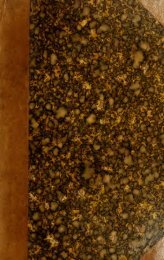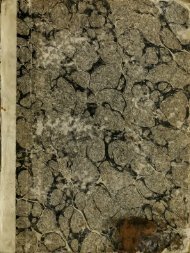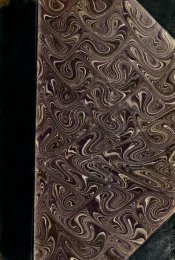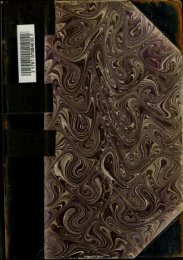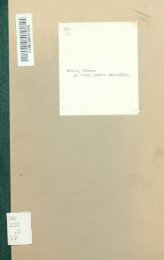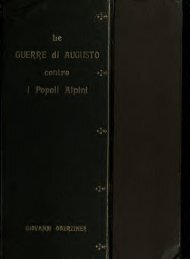Figurative uses of animal names in Latin and their ... - mura di tutti
Figurative uses of animal names in Latin and their ... - mura di tutti
Figurative uses of animal names in Latin and their ... - mura di tutti
You also want an ePaper? Increase the reach of your titles
YUMPU automatically turns print PDFs into web optimized ePapers that Google loves.
He found it both convenient <strong>and</strong> necessary to designate<br />
the various creatures he hunted, whose capture was so essential<br />
to him. His <strong>in</strong>terest <strong>in</strong> the <strong>animal</strong> world is attested by<br />
the large number <strong>of</strong> onomatopoetic <strong>animal</strong> <strong>names</strong>, <strong>and</strong><br />
verbs represent<strong>in</strong>g <strong>their</strong> cries.''<br />
For better protection aga<strong>in</strong>st man <strong>and</strong> beast, he allied<br />
himself with other men. The clan or tribe was formed.<br />
He found greater need <strong>of</strong> a more extensive me<strong>di</strong>um <strong>of</strong> communication.<br />
He groped about for greater freedom <strong>and</strong><br />
fulness <strong>of</strong> expression. He drew upon the resources nearest<br />
at h<strong>and</strong>, the th<strong>in</strong>gs with which he was by force <strong>of</strong> cir-<br />
cumstances most familiar. He called a man a deer because<br />
he was fleet, a sheep because he was timid, a fox because<br />
he was sly. The terms might persist <strong>and</strong> become personal<br />
<strong>names</strong>,* or even designate a nation.^<br />
In his op<strong>in</strong>ion the <strong>animal</strong>s were capable <strong>of</strong> communicat<strong>in</strong>g<br />
<strong>and</strong> reason<strong>in</strong>g.^" He attributed to them various pow-<br />
ers <strong>of</strong> prognostication.^^ He endowed parts <strong>of</strong> <strong>their</strong> bo<strong>di</strong>es<br />
with magical reme<strong>di</strong>al powers.-'^ He went so far as to<br />
deify them.^* The most savage <strong>animal</strong> might be accepted<br />
by a tribe <strong>of</strong> men as a totem <strong>and</strong> thereafter be developed<br />
<strong>in</strong>to a god."<br />
Not content with fables <strong>and</strong> myths about well-known<br />
<strong>animal</strong>s, -"^^ he fashioned from his own imag<strong>in</strong>ation beasts<br />
<strong>of</strong> fantastic shape.^®<br />
He forsook his hunt<strong>in</strong>g <strong>and</strong> noma<strong>di</strong>c life for agricultural<br />
pursuits. His observation <strong>of</strong> the <strong>animal</strong> world became<br />
keener, if possible. It took a long search to f<strong>in</strong>d beasts<br />
' Mugit bovis, ovis balat, equi h<strong>in</strong>niunt, gall<strong>in</strong>a pipat. Non. 156, M.<br />
'Lat<strong>in</strong> As<strong>in</strong>us, Asella, Aguila, etc.; Greek ToCpos, "Ittttos, K6paf, etc.;<br />
English Crow, Fox, etc. ; In<strong>di</strong>an Big Bear, Hawk Eye, etc.<br />
•BotwrroSs.P<strong>in</strong>d. O. 6, 153.<br />
" Probably the conversation between Achilles <strong>and</strong> his horse Xanthus {II.<br />
xix, 408 sqq.) is a rem<strong>in</strong>iscence <strong>of</strong> the naivete <strong>of</strong> primitive times.<br />
"Pl<strong>in</strong>. Nat. viii, 28, 42 (102-103).<br />
" Pl<strong>in</strong>. Nat. xxx, treats <strong>of</strong> reme<strong>di</strong>es derived from various <strong>animal</strong>s.<br />
" lx9ii»v— <strong>of</strong>ls ol Sipoi deois M/ulfiy, Xen. Anab. i, 4, 9. Cf. also Ov.<br />
Fasti, ii, 471 sqq.<br />
" A. Lang, The Secret <strong>of</strong> the Totem.<br />
'" Cf. Gubernatis, Zoological Mythology. Cf . also, Aesop, Phaedrus,<br />
Hyg<strong>in</strong>us, Babrius, etc.<br />
" Centaur, unicorn, etc.


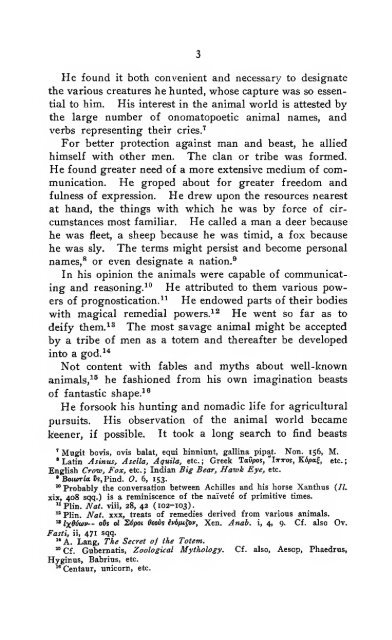
![Das Kriegswesen der Alten [microform] - mura di tutti](https://img.yumpu.com/21606999/1/167x260/das-kriegswesen-der-alten-microform-mura-di-tutti.jpg?quality=85)
